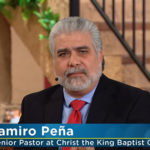Posted: 5/14/04
Authentic Christian lives convince
postmoderns gospel is true, pastor says
By Ken Camp
Managing Editor
ARLINGTON–In a culture where spirituality is more about human gratification than relationship with God, Christians should follow the example of the first century church, a Dallas pastor suggested.
“I believe the 21st century will look more like the first century than any time in-between,” said Jim Denison, pastor of Park Cities Baptist Church in Dallas.
“The apostolic Christians were where we are. We must live so authentically that others want what they see in us.”
Denison participated in a recent panel discussion on world religions and worldviews competing with Christianity.
The seminar was part of a national leadership conference on “ultimate questions,” sponsored by the John Newport Foundation.
World religions and “new consciousness” worldviews are gaining popularity–particularly in the United States–because authority structures have changed radically, said Denison, who first was Newport's student and later his colleague on the philosophy of religion faculty at Southwestern Baptist Theological Seminary.
Denison traced a shift from belief in the church as the arbiter of truth to a postmodern worldview that denies the possibility of knowing objective truth.
For the first 1,000 years after Christianity became Rome's official religion, the source of authority for faith and practice was the Scripture as interpreted by the church, he noted.
With the Reformation, the source of authority became the Bible as interpreted by the individual.
Later, philosophers exalted human reason as the basis for authority, until other philosophers pointed to personal sensory experience as its foundation. That led to the postmodern belief in truth as relative and individual, rather than as absolute and objective, he said.
Denison compared it to the claim of ancient skeptics who said: “There is no such thing as certainty, and we're sure of it.”
Christians need to change their strategy for presenting the gospel to people who hold this postmodern worldview, Denison said.
"In modernity, we told our culture: 'Christianity is true; it is therefore relevant and attractive.' … In the postmodern culture, we must use exactly the opposite strategy," Denison said. "Our faith must be attractive. Then it might be relevant; then it might be true."
Twenty-first century Christians should show postmodern seekers lives transformed by the gospel and invite them to “try it” for themselves–the same approach taken by first century Christians who lived in pre-modern, pre-Christian world, he said.
“We must live authentic lives that are so attractive, we earn the right to share the good news,” Denison said.
Panelist Stan Parks, who served with Cooperative Baptist Fellowship Global Missions before joining Texas Baptists' WorldconneX network, noted world religions and competing worldviews no longer are the sole domain of foreign missionaries. “While we slept, the world came to us,” Parks said.
Christians can find a common ground for dialogue by holding to a holistic, genuinely biblical worldview, rather than accepting the ideas of Plato, the Greek philosopher who divided reality into the supernatural and natural worlds, he said.
“In the biblical worldview, the only distinction is between the Creator and the created,” Parks said.
Albert Reyes, president of the Baptist University of the Americas, also underscored the missions implications of demographic changes in the United States–particularly regarding Hispanic growth in Texas.
“Migration will marginalize postmodernism” in the United States over the next few decades, he predicted.
Denison, who identified postmodernism as a “parenthesis” worldview that would be supplanted by something else, agreed, pointing out that Latinos, in particular, tend more toward pragmaticism than postmodernism.
Christians should model “transformational living” and develop “cross-cultural competency” to respond effectively to the “new demographic reality,” Reyes said.













We seek to connect God’s story and God’s people around the world. To learn more about God’s story, click here.
Send comments and feedback to Eric Black, our editor. For comments to be published, please specify “letter to the editor.” Maximum length for publication is 300 words.